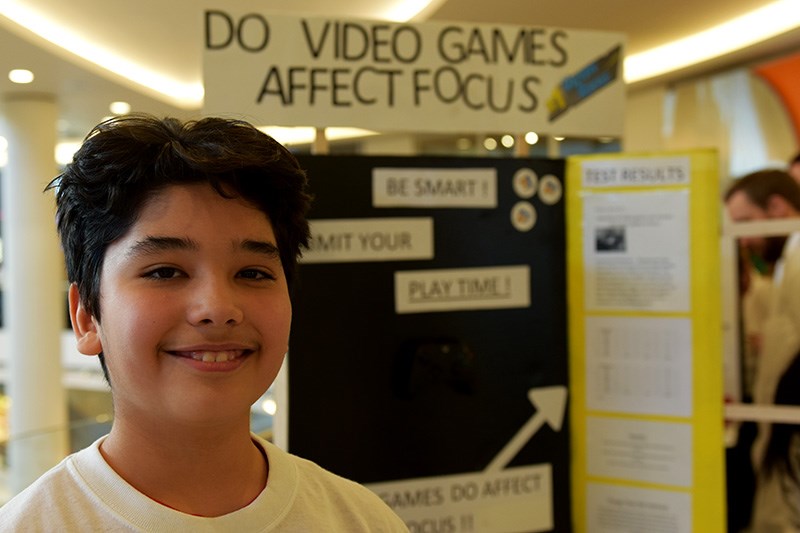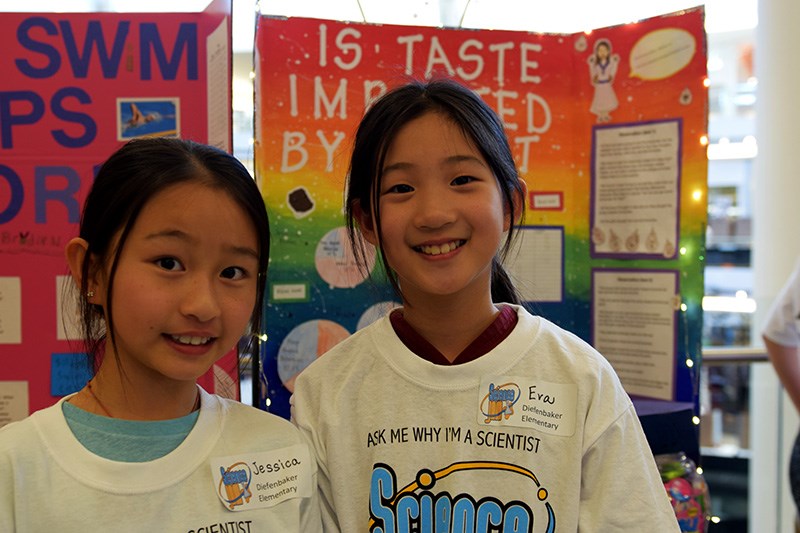Elementary school students from across Richmond gathered Tuesday to present their research projects, experiments and inventions at the district’s annual Science Jam.
Held at Aberdeen Centre, the young scientists explained their research questions and findings to older high school students, parents, friends and local celebrities.
“This is really a celebration of science learning,” said teacher-consultant Neal Campbell who’s been organizing the non-competitive science fair for the past three years.
Mayor Malcolm Brodie made an appearance, and some students played science games on stage while others reaching high to catch prizes tossed into the crowd.
Mayor Malcolm Brodie at Richmond Science Jam this afternoon, where elementary school students present their research/experiments/inventions #RichmondBC pic.twitter.com/EtoQalyqH1
— Megan Devlin (@MegDevlinn) February 27, 2019
Preparing for Science Jam improves their critical thinking, tests their creativity and hones their communication skills, Campbell said.
The event is part of the district’s Education Week, which shows the community what students are learning in their classrooms.
“A lot of (the kids) have been working on (their project) for a few months. So there's a lot of buildup and anticipation for them to come here and display their projects in a public setting,” said David Sadler, spokesperson for the district.
Here’s what some of the young scientists had to say:
Do video games affect focus?

Canada Demircan and his partner asked a group of friends to play a video game for 10 minutes and then complete a concentration test where they had to find a hidden object in 15 second time limit.
He compared them against a control group who completed the concentration test without playing the game.
“We found out (video games) actually did affect focus, but in a negative way,” he said.
Those who played the video game had more trouble finding the object.
Even though he loves video games, the Grade 7 student said he’s thinking about limiting his time on them after this experiment.
Dark vs. Light

Ella Lynch baked cookies to see if people could recognize their favourite type of chocolate chips blindfolded.
As it turned out, people had trouble tasting their preference. They tended to pick the cookies with dark chocolate chips as their favourite, even if they said previously they preferred milk chocolate.
“Your taste buds can really change depending on what your first view of the food is,” The Grade 7 student said.
Magnets: Does size matter?

Ethan Rizarri and Javis Wong wanted to see if a magnet’s size impacts its strength.
The Grade 5 students tested several different magnets to see how far away they could move a paperclip. They strongest magnet, they said, could move a paperclip from nine centimetres away.
One thing they learned, though, is you need to control for the different metals magnets are made of.
Is taste impacted by how food looks?

Eva Zeng and Jessica Kwok baked a batch of brownies and rolled some of them to look like pieces of poop. They sold those brownies alongside regular-shaped ones at school, to see what kind people would prefer.
Zeng thought people would avoid the poop-shaped brownies, so they made them slightly cheaper than the regular ones.
“All the boys bought the poop-shaped brownies, and all the girls bought the regular brownies,” she said.
During further testing, the regular ones proved more popular, supporting the girls’ hypothesis that people prefer to buy food that looks better.
“I would've picked the regular one because the poop one looks super disgusting. Like actual poop,” Zeng said.
Hydroelectricity

Tyler Lewis and Tyler Girvin, in Grade 7, constructed model houses and lit up the miniature lightbulbs inside them using a wheel.
On a small scale, their project showed how hydroelectricity can light up a whole city.
The biggest challenge they said, was trying to figure out how to move the wheel with water, since their Bristol board wasn’t near a river. In the end, they rotated it by hand.
Light from vinegar

Grace Chan and Emily Cheng filled up an ice cube tray and tied a copper wire to a nail in order to illuminate an LED light.
They said finding all the materials was challenging, but were glad they put together something cool for Science Jam.
“You have to make sure the copper wire and the nail aren't touching each other in different trays. Otherwise it won't light up,” Chan said.



